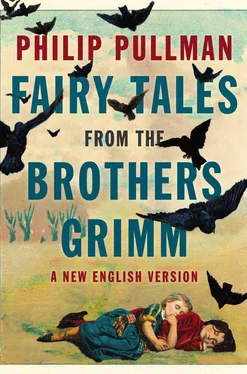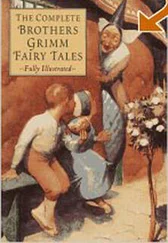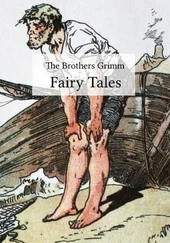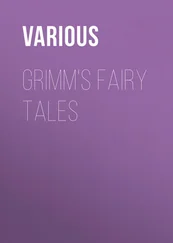And at that moment Joringel felt his limbs loosen, and he was able to move again. He flung himself to his knees before the old woman and cried, ‘Oh, please give me back my Jorinda!’
‘Never!’ said the witch. ‘You’ll never get her back.’
He pleaded, he cried aloud, he wept, but nothing would change her mind. She didn’t stop to listen, but left him crying, ‘Oh, what’s to become of me?’
He left the castle, and made his way to a village where he wasn’t known. There he found work as a shepherd, which kept him there for a long time. He often went back to gaze at the castle, but never went close.
One night he had a strange dream: he dreamed he had found a beautiful red flower with a pearl nestling in its petals. In the dream he plucked the flower and took it to the castle, where he could open every door and every wicker bird cage just by touching it with the flower, and he managed to free his Jorinda.
When he woke up next morning, he set off at once to find the flower from his dream. He searched for eight days, and on the ninth he found a flower as red as blood, with a dewdrop among its petals as large as the finest pearl.
He plucked the flower with the greatest care and set off for the castle. As he passed within the magic circle, he felt nothing stopping him: he was able to move without hindrance as far as the gate. Encouraged by that, Joringel touched the flower to the gate, which immediately sprang open.
He went in and stood in the dismal courtyard listening for the sound of the birds. It wasn’t hard to hear. He followed the sound of their singing and soon found himself in the great room where they were all kept in their seven thousand baskets.
The witch was feeding them at that moment, and when Joringel came in she stopped and turned to him, spitting and screaming with anger. Her curses were appalling, and she spat gall and venom from her wrinkled lips, but nothing touched him, and she couldn’t get close enough to scratch him with her claw-like nails.
He took no notice, but went on freeing the birds one after another, wondering how in the world he would find his Jorinda among so many. But then he noticed that the old woman had taken one basket down and was making for the door.
He leaped across the room and touched the basket with the flower, and it flew open; and he touched the witch with the flower as well, and all her powers fell away. And there was Jorinda, as beautiful as ever, and she threw her arms around his neck and hugged him tight.
He released all the other birds, and then Joringel and his Jorinda went home, where they were soon married, and they lived together happily for many years.
* * *
Tale type:ATU 405, ‘Jorinda and Joringel’
Source:Johann Heinrich Jung-Stilling’s Heinrich Stillings Jugend ( Heinrich Stilling’s Youth ; 1777)
This is an oddity, in that it isn’t like a folk tale at all. For one thing, it is the only tale in Grimm in which a description of nature (‘It was a lovely evening; the sun shone warmly…’) is there simply for the sake of describing it; for another, the behaviour of the lovers seems to exhibit such an excess of sensibility that it can only belong to literary romanticism. It simply doesn’t feel like a folk tale.
The Grimms’ source for this tale is part of the autobiography of Johann Heinrich Jung (1740–1817), a physician and friend of Goethe and best known by his assumed name, Heinrich Stilling. The motif of the quest for the flower seen in a dream recalls the archetypal work of German Romanticism, Novalis’s Heinrich von Ofterdingen (1802). This sort of thing was very much in the air at the time. ‘Jorinda and Joringel’ could be worked up at greater length, but that would take it even further from the realm of the folk tale and firmly into that of the fantasy novel. Whatever you did with it, though, you’d never rid it of the literary flavour it was born with.
The red, red ring in the verse refers to the eye of the turtledove, whose iris does appear like a red ring.
THIRTY-TWO
SIX WHO MADE THEIR WAY IN THE WORLD
There was once a man who could turn his hand to anything. He had fought in the war and conducted himself bravely, but when the war came to an end, he was sent on his way with three pennies, and nothing more.
‘Hold on,’ he said. ‘What sort of pay is this? If I find the right lads to help me, I’ll make the king empty his treasury, you wait and see.’
Furious, he marched off into the forest. He hadn’t gone far before he saw a man pulling up six trees as if they’d been stalks of corn. The soldier said to him, ‘Will you be my servant and go with me?’
‘Certainly,’ said the man, ‘but first I must take this bundle of twigs home to my mother.’
And he took one of the trees and tied it round the rest, and then slung the whole bunch up on his shoulder and carried it away. A little later he came back and went off together with his master, who said, ‘We two will certainly make our way in the world.’
They had gone a little way when they saw a hunter who was down on one knee, taking aim at something they couldn’t see.
The soldier said, ‘Hunter, what are you shooting at?’
‘Two miles from here,’ said the hunter, ‘there’s a fly sitting on the branch of an oak tree. I’m going to shoot out its left eye.’
‘Oh, come with me,’ said the soldier. ‘If we three go together, we’ll certainly make our way in the world.’
The hunter was willing, so off they went. They soon came to seven windmills whose sails were busily turning round and round, even though there wasn’t a breath of wind and not a leaf was stirring on the trees.
‘Well, would you look at that!’ said the soldier. ‘I’ve never seen the like. What can be turning those sails?’
On he went with his two servants, and two miles further on they came to a man sitting in a tree holding one nostril closed and blowing through the other.
‘What are you doing up there?’ said the soldier.
‘Two miles back along the road there are seven windmills. I’m blowing the sails round. I’m surprised you didn’t see them.’
‘Oh, come with me,’ said the soldier. ‘We saw them all right. With a talent like yours, we four will certainly make our way in the world.’
The blower agreed. They walked on, and after a while they came to a man who was standing on one leg, with his other one unhitched on the ground beside him.
‘You look as if you’ve made yourself comfortable,’ said the soldier. ‘Having a rest, are you?’
‘Well, you see, I’m a runner. I go fast — I can’t help it. With both legs on I go faster than a bird can fly.’
‘Oh, come with me,’ said the soldier. ‘That’s a rare talent. Join forces with us, and we’ll certainly make our way in the world.’
The runner joined in with them, and presently they came to a man who was wearing his cap on one side, with the flap over one of his ears.
‘Why are you wearing your hat like that?’ said the soldier. ‘You look half-witted.’
‘Ah, there’s a reason for it,’ said the man. ‘If I put it straight, such a deep frost will fall, all of a sudden, that birds will drop dead out of the air.’
‘Well, we can’t let a gift like that go begging,’ said the soldier. ‘Join the rest of us, and we’ll make our way in the world, all right.’
So he strode along with the rest, and soon they came to a city where the king had just made a proclamation. Whoever ran a race against his daughter and won would marry her and inherit the kingdom. If he lost the race, however, he’d lose his head as well.
The soldier thought this was worth risking, so he went to the king and said, ‘I’ll take on the race, your majesty, on condition that one of my servants can run instead of me.’
Читать дальше












